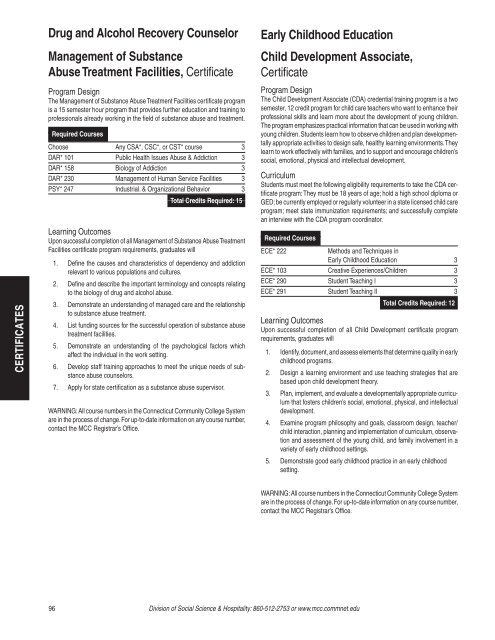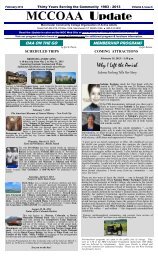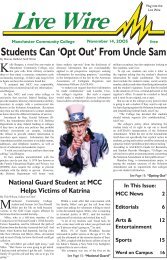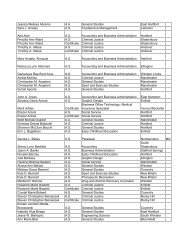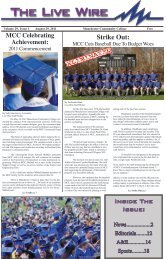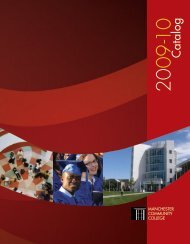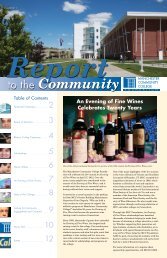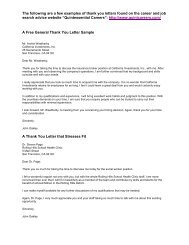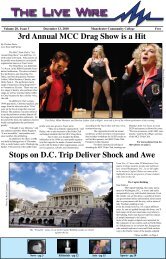Liberal Arts and Science - Manchester Community College ...
Liberal Arts and Science - Manchester Community College ...
Liberal Arts and Science - Manchester Community College ...
Create successful ePaper yourself
Turn your PDF publications into a flip-book with our unique Google optimized e-Paper software.
CERTIFICATES<br />
Drug <strong>and</strong> Alcohol Recovery Counselor<br />
Management of Substance<br />
Abuse Treatment Facilities, Certificate<br />
Program Design<br />
The Management of Substance Abuse Treatment Facilities certificate program<br />
is a 15 semester hour program that provides further education <strong>and</strong> training to<br />
professionals already working in the field of substance abuse <strong>and</strong> treatment.<br />
Required Courses<br />
Choose Any CSA*, CSC*, or CST* course 3<br />
DAR* 101 Public Health Issues Abuse & Addiction 3<br />
DAR* 158 Biology of Addiction 3<br />
DAR* 230 Management of Human Service Facilities 3<br />
PSY* 247 Industrial. & Organizational Behavior 3<br />
96<br />
Total Credits Required: 15<br />
Learning Outcomes<br />
Upon successful completion of all Management of Substance Abuse Treatment<br />
Facilities certificate program requirements, graduates will<br />
1. Define the causes <strong>and</strong> characteristics of dependency <strong>and</strong> addiction<br />
relevant to various populations <strong>and</strong> cultures.<br />
2. Define <strong>and</strong> describe the important terminology <strong>and</strong> concepts relating<br />
to the biology of drug <strong>and</strong> alcohol abuse.<br />
3. Demonstrate an underst<strong>and</strong>ing of managed care <strong>and</strong> the relationship<br />
to substance abuse treatment.<br />
4. List funding sources for the successful operation of substance abuse<br />
treatment facilities.<br />
5. Demonstrate an underst<strong>and</strong>ing of the psychological factors which<br />
affect the individual in the work setting.<br />
6. Develop staff training approaches to meet the unique needs of substance<br />
abuse counselors.<br />
7. Apply for state certification as a substance abuse supervisor.<br />
WARNING: All course numbers in the Connecticut <strong>Community</strong> <strong>College</strong> System<br />
are in the process of change. For up-to-date information on any course number,<br />
contact the MCC Registrar’s Office.<br />
Early Childhood Education<br />
Child Development Associate,<br />
Certificate<br />
Program Design<br />
The Child Development Associate (CDA) credential training program is a two<br />
semester, 12 credit program for child care teachers who want to enhance their<br />
professional skills <strong>and</strong> learn more about the development of young children.<br />
The program emphasizes practical information that can be used in working with<br />
young children. Students learn how to observe children <strong>and</strong> plan developmentally<br />
appropriate activities to design safe, healthy learning environments. They<br />
learn to work effectively with families, <strong>and</strong> to support <strong>and</strong> encourage children’s<br />
social, emotional, physical <strong>and</strong> intellectual development.<br />
Curriculum<br />
Students must meet the following eligibility requirements to take the CDA certificate<br />
program: They must be 18 years of age; hold a high school diploma or<br />
GED; be currently employed or regularly volunteer in a state licensed child care<br />
program; meet state immunization requirements; <strong>and</strong> successfully complete<br />
an interview with the CDA program coordinator.<br />
Required Courses<br />
ECE* 222 Methods <strong>and</strong> Techniques in<br />
Early Childhood Education 3<br />
ECE* 103 Creative Experiences/Children 3<br />
ECE* 290 Student Teaching I 3<br />
ECE* 291 Student Teaching II 3<br />
Total Credits Required: 12<br />
Learning Outcomes<br />
Upon successful completion of all Child Development certificate program<br />
requirements, graduates will<br />
1. Identify, document, <strong>and</strong> assess elements that determine quality in early<br />
childhood programs.<br />
2. Design a learning environment <strong>and</strong> use teaching strategies that are<br />
based upon child development theory.<br />
3. Plan, implement, <strong>and</strong> evaluate a developmentally appropriate curriculum<br />
that fosters children’s social, emotional, physical, <strong>and</strong> intellectual<br />
development.<br />
4. Examine program philosophy <strong>and</strong> goals, classroom design, teacher/<br />
child interaction, planning <strong>and</strong> implementation of curriculum, observation<br />
<strong>and</strong> assessment of the young child, <strong>and</strong> family involvement in a<br />
variety of early childhood settings.<br />
5. Demonstrate good early childhood practice in an early childhood<br />
setting.<br />
WARNING: All course numbers in the Connecticut <strong>Community</strong> <strong>College</strong> System<br />
are in the process of change. For up-to-date information on any course number,<br />
contact the MCC Registrar’s Office.<br />
Division of Social <strong>Science</strong> & Hospitality: 860-512-2753 or www.mcc.commnet.edu


